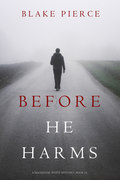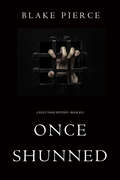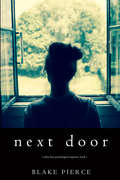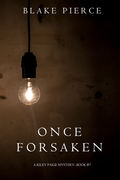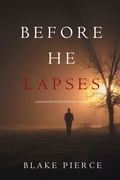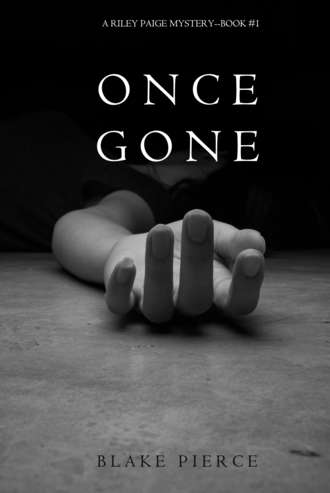
Блейк Пирс
Once Gone
Chapter 25
Riley’s cell phone buzzed early the next morning. She was sitting at her coffee table, looking at the map she had followed yesterday, planning a new route for today. When she saw that the call was from Bill, her nerves quickened. Would this be good or bad news?
“Bill, what’s going on?”
She heard her former partner sigh miserably.
“Riley, are you sitting down?”
Riley’s heart sank. She was glad that she was sitting down. She knew now that Bill’s tone of voice could only mean one terrible thing, and she felt her muscles weaken with dread.
“They’ve found Cindy MacKinnon,” Bill said.
“And she’s dead, isn’t she?” Riley said with a gasp.
Bill said nothing for a moment. But his silence answered Riley’s question. Riley felt tears welling up – tears of shock and helplessness. She fought against them, determined not to cry.
“Where did they find her?” Riley asked.
“Pretty far to the west of the other victims, in the national forest, almost to the West Virginia line.”
She looked at her map. “What’s the nearest town?” He told her and she found the approximate location. It wasn’t inside the triangle made by the other three sites where bodies had been found. But still, there must be some sort of relationship with the other sites. She couldn’t quite place what it was.
Bill continued describing the discovery.
“He put her next to a cliff in an open area, no trees around it. I’m at the scene right now. It’s horrible. He’s getting bolder, Riley.”
And acting faster, Riley thought with despair. He’d only kept this victim alive for a few days.
“So Darrell Gumm really is the wrong guy,” Riley said.
“You’re the only one who said so,” Bill replied. “You were right.”
Riley struggled to comprehend the situation.
“So has Gumm been released?” she asked.
Bill grunted with annoyance.
“Not a chance,” he said. “He’ll be facing obstruction charges. He’s got a lot to answer for. Not that he seems to care. But we’ll try to keep his name out of the news as much as we can. That amoral prick doesn’t deserve the publicity.”
A silence fell between them.
“Damn it, Riley,” Bill said at last, “if only Walder had listened to you, maybe we could have saved her.”
Riley doubted that. It wasn’t as if she’d had any solid leads of her own; but maybe with all that redirected manpower, something could have been turned up in those precious hours.
“Have you got any photos?” she asked. Her heart was pounding.
“Yeah, Riley, but – ”
“I know you’re not supposed to show them to me. But I’ve got to see them. Could you send them to me?”
After a pause, Bill said, “Done.”
A few moments later, Riley was looking at a series of ghastly images on her cell phone. The first was a close-up of that face she had seen in a picture just a few days back. Then the woman had been beaming with love over a happy little girl and her brand new doll. But now that face was pallid, its eyes stitched open, a hideous smile painted over its lips.
As she looked through more pictures, she saw that the display was a match for how Reba Frye’s corpse had been arranged. All of the details were there. The pose was precise. The body was naked and splayed, sitting stiffly upright like a doll. An artificial rose was on the ground between her legs.
This was the killer’s true signature, his message. This was the effect he’d wanted to achieve all along. He’d achieved mastery with his victims number three and four. Riley knew perfectly well he was all ready to do it again.
After looking at the pictures, Riley got back on the phone with Bill.
“I’m so sorry,” she said, her voice choked with horror and sadness.
“Yeah, me too,” he said. “But have you got any ideas at all?”
Riley ran the images she had just seen through her mind.
“I assume the wig and rose are the same as the others,” she said. “The ribbon, too.”
“Right. They look the same.”
She paused again. What clues could Bill’s team hope to find?
“Did you get the call early enough to check for tracks, footprints?” she asked.
“The scene was secured early this time. A ranger spotted her and called the Bureau directly. No local cops tromping around. But we didn’t find anything useful. This guy is careful.”
Riley thought hard for a few moments. The photos had showed a woman’s body sitting in the grass, leaning against a rock formation. Questions were buzzing through her mind.
“Was the body cold?” she asked.
“It was by the time we got to it.”
“How long do you think it had been there?”
She could hear Bill thumbing through his notebook.
“I don’t know for sure, but she was put into this pose soon after death. According to discoloration, within a few hours. We’ll know more after the coroner gets to work.”
Riley felt her familiar impatience well up. She wanted to get a clearer sense of the killer’s chronology.
She asked, “Could he have posed her where he killed her and then brought her to the location after the body was in rigor mortis?”
“Probably not,” Bill said. “I don’t see anything awkward about the position. I don’t think she could have already been stiff before he brought her here. Why? Do you think he brought her here and then killed her?”
Riley closed her eyes and thought hard.
Finally she said, “No.”
“You’re sure?”
“He killed her wherever he kept her and then brought her to the site. He wouldn’t have brought her there alive. He wouldn’t want to struggle with a human being in his truck or on the site.”
Her eyes still shut tight, Riley reached inside herself for a sense of the killer’s mind.
“He would only want to bring the raw materials for the statement he was making,” she said. “Once she was dead, that’s what she was to him. Like a piece of artwork, no longer a woman. So he killed her, washed her down, dried her, prepared the body just the way he wanted it, all covered with Vaseline.”
The scene was starting to play out in her imagination in vivid detail.
“He got her to the location when rigor mortis was setting in,” she said. “He timed it perfectly. After killing three other women, he understood just how that would work. He made the onset of rigor part of his creative process. He posed her as she hardened, little by little. He molded her like clay.”
Riley found it hard to say what she saw happening next in her mind – or the killer’s mind. The words came out slowly and painfully.
“By the time he’d finished sculpting the rest of her body, her chin still rested on her chest. He felt the muscles of her shoulders and neck, sensing the exact state of remaining pliability, and tilted the head up. He held it there until it stiffed. It might have taken two or three minutes. He was patient. Then he stepped back and enjoyed his handiwork.”
“Jesus,” Bill murmured in a hushed, shocked voice. “You’re good.”
Riley sighed bitterly and didn’t reply. She didn’t think she was good – not anymore. All she was good at was getting into a sick mind. What did that say about her? How did it do anybody any good? It certainly hadn’t helped Cindy MacKinnon.
Bill asked, “How far away do you think he holds the victims while they’re still alive?”
Riley did some swift mental calculations, visualizing a map of the area in her head.
“Not very far from where he posed her,” she said. “Probably under two hours away.”
“That still covers a lot of territory.”
Riley’s spirits were ebbing by the second. Bill was right. She wasn’t saying a single thing that could be any help.
“Riley, we need you back on this case,” Bill said.
Riley groaned under her breath.
“I’m sure Walder doesn’t think so,” she said.
I don’t think so, either, she thought.
“Well, Walder’s wrong,” Bill said. “And I’m going to tell him he’s wrong. I’m going to get you back on the job.”
Riley let Bill’s words sink in for a moment.
“It’s too much of a risk for you,” she said at last. “Walder’s liable to fire you too if you make waves.”
Bill stammered, “But – but Riley – ”
“No ‘buts,’ Bill. If you get yourself fired, this case will never get solved.”
Bill sighed. His voice was tired and resigned.
“Okay,” he said. “But have you got any ideas at all?”
Riley thought for a moment. The abyss she’d been peering into for the last couple of days yawned wider and deeper. She felt what little was left of her resolve slipping away through her fingers. She’d failed, and a woman was dead.
Still, maybe there was one more thing she could do.
“I have some ideas brewing,” she said. “I’ll let you know.”
As they ended the call, the smell of coffee and fried bacon reached Riley from the kitchen. April was in there. She’d been making breakfast ever since Riley had gotten out of bed.
Without even being asked! Riley thought.
Maybe spending time with her father was making her appreciate Riley, at least a little. April never liked having to be around Ryan. Whatever the reason, Riley was grateful for even the smallest comfort on a morning like this.
She sat there thinking about what to do next. She’d been planning to drive west again today, following the new route she’d mapped out. But she felt defeated, completely beaten down by this terrible turn of events. Yesterday she hadn’t been at her best, and had even succumbed to that drink in Glendive. She couldn’t do the same thing today, not in her present state of mind. She’d surely make mistakes. And too many mistakes had been made already.
But the location of the store was still important – maybe more important than ever. The killer would target his next victim there, if he hadn’t already. Riley got on her computer and composed an email for Bill, with a copy of her map attached.
She explained to Bill which towns and which stores ought to be checked. Bill himself should probably stay focused on finding the killer’s house, she wrote. But maybe he could persuade Walder to send someone else along Riley’s route – as long as Walder didn’t find out that it was her idea.
She sat there, staring at the map again and again, and slowly she began to spot a pattern she had not seen before. It was not that the sites related to each other, but that they were spread out in a lopsided fan from another mark on her map – the area enclosed by the four women’s addresses. As she studied it, it made her more convinced than ever that the selection of victims was centered around some particular place that they all went, a particular doll store. And wherever the killer took his victims, it probably wasn’t a long distance from where he first saw them.
But why hadn’t she been able to find the store? Was she taking the wrong approach? Was she so stuck on a single idea that she couldn’t see any other clues? Was she just imagining a pattern that was leading her completely astray?
Riley scanned her map and sent it along to Bill with her notes.
“Breakfast is ready, Mom.”
As she sat down with her daughter, Riley found herself fighting back tears again.
“Thank you,” she said. She began to eat silently.
“Mom, what’s wrong?” April asked.
Riley was surprised at the question. Did she hear a note of concern in her daughter’s voice? The girl was still pretty taciturn with Riley most of the time, but at least she hadn’t been openly rude for a few days.
“Nothing’s wrong,” Riley said.
“That’s not true,” April said.
Riley said nothing in reply. She didn’t want to drag April into the horrible reality of the case. Her daughter was troubled enough already.
“Was that Bill on the phone?” April asked.
Riley nodded silently.
“What did he call about?” April asked.
“I can’t talk about it.”
A long silence fell between them. They both kept on eating.
Finally April said, “You keep trying to get me to talk to you. That cuts both ways, you know. You never talk to me, not really. Do you ever talk to anybody anymore?”
Riley stopped eating and stifled a sob as it rose up in her throat. It was a good question. And the answer was no. She didn’t talk to anybody at all, not anymore. But she couldn’t bring herself to say so.
She reminded herself that it was Saturday, and she wasn’t taking April to school. And she’d made no plans for April to stay with her father. And even though Riley wasn’t going to drive west in search of clues, there was still something she had to do.
“April, I’ve got to go somewhere,” she said. “Will you be okay here by yourself?”
“Sure,” April said. Then, in a truly sad voice, she asked, “Mom, could you at least tell me where you’re going?”
“I’m going to a funeral.”
Chapter 26
Riley arrived at the parlor in Georgetown shortly before Marie’s service was scheduled to begin. She dreaded funerals. To her, they were worse than arriving at a crime scene with a freshly murdered body. They always got inside her gut in some terrible way. Yet Riley felt she still owed something – she wasn’t sure what – to Marie.
The funeral parlor had a facade of prefab brick panels and white columns on the front portico. She entered a carpeted, air-conditioned foyer that led into a hallway wallpapered in muted pastel colors gauged to be neither depressing nor cheery. The effect backfired on Riley, adding to her feeling of despair. She wondered why funeral homes couldn’t just be the gloomy and uninviting places they really ought to be, like mausoleums or morgues, with none of this phony sanitization.
She passed several rooms, some with caskets and visitors, others empty, until she arrived where Marie’s service was to be held. At the far end of the room she saw the open casket, made out of burnished wood with a long brass handle along the sides. Perhaps two dozen people had showed up, many of them seated, some of them mingling and whispering. Bland organ music was being pumped into the room. A small viewing line was passing the coffin.
She got in line and soon found herself standing beside the coffin, looking down at Marie. For all of Riley’s mental preparation, it still gave her a jolt. Marie’s face was unnaturally passive and serene, not twisted and agonized, as it had been when she was hanging from that light fixture. This face was not stressed and fearful, as it had been when they had talked in person. It seemed wrong. Actually, it seemed worse than wrong.
She quickly moved past the coffin, noticing a somewhat elderly couple sitting in the front row. She assumed that they were Marie’s parents. They were flanked by a man and woman closer to Riley’s age. She took them to be Marie’s brother and sister. Riley reached back into memories of conversations with Marie and recalled that their names were Trevor and Shannon. She had no idea what Marie’s parents’ names were.
Riley thought of stopping to offer the family her condolences. But how would she introduce herself? As the woman who rescued Marie from captivity, only to find her corpse later? No, surely she was the last person they wanted to see right now. It was best to leave them to grieve in peace.
As she made her way to the back of the room, Riley realized that she didn’t recognize a single person there. That seemed strange and terribly sad. After all their countless hours of video chatting and their single face-to-face meeting, they didn’t have one friend in common.
But they did have one terrible enemy in common – the psychopath who had held them both. Was he here today? Riley knew that killers commonly visited the funerals and graves of victims. Deep down, as much as she owed it to Marie, she also had to admit that that was the real reason she had come here today. To find Peterson. It was also why she was carrying a concealed weapon – her personal Glock that she normally kept boxed in her car trunk.
As she walked toward the back of the room, she scanned the faces of those already seated. She had glimpsed Peterson’s face in the glare of his torch, and she’d seen pictures of him. But she’d never gotten a really good look at him face to face. Would she recognize him?
Her heart pounded as she looked at all the faces suspiciously, searching for a murderer in each one. They all soon became a blur of grief-stricken faces, staring back puzzlingly at her.
Seeing no obvious suspects, Riley sat down in an aisle seat in the back row, separated from anyone else, where she could watch anyone who entered or exited.
A young minister stepped up to a podium. Riley knew that Marie hadn’t been religious, so the minister must have been her family’s idea. The stragglers sat down, and everybody became quiet.
In a hushed and rather professional-sounding voice, the minister began with familiar words.
“‘Even though I walk through the valley of the shadow of death, I will fear no evil, for you are with me; your rod and your staff, they comfort me.’”
The minister paused for a moment. In the brief silence, a single phrase echoed through Riley’s mind…
“I will fear no evil.”
Somehow, it struck Riley as a grotesquely inappropriate thing to say. What did it even mean to “fear no evil”? How could it possibly be a good idea? If Marie had been more fearful months ago, more wary, maybe she wouldn’t have fallen into Peterson’s clutches at all.
This was definitely a time to be fearful of evil. There was plenty of it out there.
The minister began to speak again.
“My friends, we have gathered here to mourn the loss and celebrate the life of Marie Sayles – daughter, sister, friend, and colleague…”
The minister then launched into a boilerplate homily about loss, friendship, and family. Although he described Marie’s “passing” as “untimely,” he made no mention of the violence and terror that had haunted the last weeks of her life.
Riley quickly tuned out his sermon. As she did, she remembered the words in Marie’s suicide note.
“This is the only way.”
Riley felt a knot of guilt swelling inside of her, growing so large that she almost couldn’t breathe. She wanted to rush up to the front of the room, push the minister aside, and confess to the congregation that this was all, all her own fault. She had failed Marie. She had failed everyone who loved Marie. She had failed herself.
Riley fought back the urge to confess, but her unease started to take on a brutal clarity. First there had been the funeral home’s prefab bricks, silly white columns, and pastel-colored wallpaper. Next had been Marie’s face, so unnatural and waxy in the coffin. And now here was the preacher, gesturing and talking like some kind of toy, a miniature automaton, and the congregation of little heads bobbing as he spoke to them.
It’s like a doll house, Riley now realized.
And Marie was posed in the coffin – not a real corpse, but a pretend one, in a pretend funeral.
Horror cascaded over Riley. The two murderers – Peterson and whoever had killed Cindy MacKinnon and the others – merged together in her mind. It didn’t matter that the pairing was completely groundless and irrational. She couldn’t disentangle them. They became one to her.
It seemed as though this well-crafted funeral was the monster’s final touch. It announced that there would be many more victims and many more funerals to follow.
As she sat there, Riley noticed out of the corner of her eyes someone slip in quietly to the service and sit on the other end of the back row. She turned her head slightly to see who had arrived in the middle of the service and saw a man dressed casually, wearing a baseball cap drawn low, shielding his eyes. Her heart beat faster. He looked large and strong enough to be the one who overpowered her when he caught her. His face was hard, jaws clenched, and she thought that he had a guilty look about him. Could it be the killer she was looking for?
Riley realized that she was almost hyperventilating. She slowed her breathing down until her head cleared. She had to restrain herself from leaping up and arresting the latecomer. The service was obviously coming to a close, and she couldn’t disrupt it and disrespect Marie’s memory. She had to wait. What if it wasn’t him?
But then, to her surprise, he suddenly got to his feet and quietly left the room. Had he spotted her?
Riley jumped up and followed him. She sensed heads turn at her sudden commotion, but that didn’t matter now.
She trotted through the funeral parlor hallway toward the front entrance, and as she threw open the front door, she saw that the man was walking briskly away along the city sidewalk. She drew her handgun and charged after him.
“FBI!” she shouted. “Stop right there!”
The man whirled around to face her.
“FBI!” she repeated, once again feeling naked without her badge. “Keep your hands where I can see them.”
The man facing her looked utterly baffled.
“ID!” she demanded.
His hands were shaking – whether from fear or indignation, Riley couldn’t tell. He fished out a wallet with a driver’s license and as she scanned it, she saw it identified him as a Washington resident.
“Here’s my ID,” he said. “Where’s yours?”
Riley’s resolution started to slip away. Had she ever seen this man’s face before? She wasn’t sure.
“I’m an attorney,” the man said, still very shaken. “And I know my rights. You’d better have a good reason for pulling a gun on me for no reason. Right here on a city street.”
“I’m Agent Riley Paige,” she said. “I need to know why you were attending that funeral.”
The man looked at her more closely.
“Riley Paige?” he asked. “The agent who rescued her?”
Riley nodded. The man’s face suddenly sagged with despair.
“Marie was a friend,” he said. “Months ago, we were close. And then this terrible thing happened to her and…”
The man choked back a sob.
“I’d lost touch with her. It was my fault. She was a good friend, and I didn’t stay in touch. And now I’ll never get a chance to…”
The man shook his head.
“I wish I could go back and do everything differently. I just feel so bad about it. I couldn’t even make it all the way through the funeral. I had to leave.”
This man was feeling guilty, Riley realized, and in pain. For reasons very much like her own.
“I’m sorry,” Riley said softly, deflated, lowering her gun. “I really am. I will find the bastard who did this to her.”
As she turned to walk away, she heard him call out in a perplexed tone.
“I thought he was already dead?”
Riley didn’t reply. She left the bereaved man standing on the sidewalk.
And as she walked away, she knew exactly where she needed to go. A place where no one else on earth, except Marie, could possibly understand.
* * *
Riley drove through city streets that transitioned from Georgetown’s elegant homes to a ramshackle neighborhood in a once-thriving industrial area. Many buildings and stores were abandoned, and the local residents were poor. The deeper she drove, the worse it became.
She finally parked along a block that consisted entirely of condemned row houses. She got out of the car and quickly found what she was looking for.
Two vacant homes flanked a broad, barren area. Not very long ago, three deserted houses had stood here. Peterson had lived as a squatter in the middle house, using it as his secret lair. It had been the perfect spot for him, too separated from living inhabitants for anyone to hear the screams coming from beneath the house.
Now the space had been leveled flat, all evidence of the houses cleared away, and grass was starting to grow there. Riley tried to visualize what it had looked like when the houses had been there. It wasn’t easy. She’d only been here once when the houses were standing. And then it had been night.
As she walked into the clearing, memories started to come back to her…
Riley had been trailing him all day and into the night. Bill had been called away on an unrelated emergency, and Riley had unwisely decided to follow the man here alone.
She watched him enter the wretched little house with boarded up windows. Then, just a few moments later, he left again. He was on foot, and she didn’t know where he was going.
She briefly considered calling for backup. She decided against it. The man had gone away, and if the victim was really inside that house, she couldn’t leave her alone and in torment for another minute. She walked up onto the porch and squeezed her way between boards that only partially blocked the doorway.
She turned on her flashlight. The beam reflected against at least a dozen tanks of propane gas. It was no surprise. She and Bill knew that the suspect was obsessed with fire.
Then she heard a scratching below the floorboards, then a weak cry…
Riley paused the flow of memories. She looked around. She felt sure – uncannily sure – that she was now standing on the very spot that she both dreaded and sought. It was here where both she and Marie had been caged in that dark and filthy crawlspace.
The rest of the story was still raw in her mind. Riley had been captured by Peterson when she set Marie free. Marie had staggered a couple of miles in a state of complete shock. By the time she was found, she had no idea where she had been held captive. Riley was left alone in the dark to find her own way out.
After a seemingly endless nightmare, tormented repeatedly by Peterson’s torch, Riley had gotten loose. When she did, she had beaten Peterson nearly unconscious. Every blow gave her a great sense of vindication. Maybe those blows, that small vindication, she reflected, had allowed her to heal better than Marie.
Then, crazed and maddened with fear and exhaustion, Riley had opened all the tanks of propane. As she fled the house, she threw a lighted match back inside. The explosion threw her all the way across the street. Everyone was amazed that she’d survived.
Now, two months after that explosion, Riley stood looking around at her grim handiwork – a vacant space where nobody lived or was likely to live for a long time. It seemed like a perfect image of what her life had become. In a way, it seemed like the end of the road – at least for her.
A sickening feeling of vertigo came over her. Still standing in that grassy spot, she felt as if she were falling, falling, falling. She tumbled straight into that abyss that had been yawning open for her. Even in broad daylight, the world seemed terribly dark – even darker than it had been in that cage in that crawlspace. There seemed to be no bottom to the abyss, and no end to her fall.
Riley recalled once again Betty Richter’s assessment of the odds that Peterson had been killed.
I’d say ninety-nine percent.
But that nagging one percent somehow rendered the other ninety-nine meaningless and absurd. And besides, even if Peterson really had died, what difference did it make? Riley remembered Marie’s awful words on the phone on the day of her suicide.
Maybe he’s like a ghost, Riley. Maybe that’s what happened when you blew him up. You killed his body but you didn’t kill his evil.
Yes, that was it. She had been fighting a losing battle all her life. Evil, after all, haunted the world, as surely as it did this place where she and Marie had suffered so horribly. It was a lesson she should have learned as a little girl, when she couldn’t stop her mother from being murdered. The lesson was hammered home by Marie’s suicide. Rescuing her had been pointless. There was no point in rescuing anybody, not even herself. Evil would prevail in the end. It was just as Marie had told her over the phone.
You can’t fight a ghost. Give it up, Riley.
And Marie, so much braver than Riley had known, finally took matters into her own hands. She’d explained her choice in five simple words.
This is the only way.
But that was not courage, to take your life own life. That was cowardice.
A voice broke through Riley’s darkness.
“You all right, lady?”
Riley looked up.
“What?”
Then, slowly, she realized that she was on her knees in a vacant city lot. Tears were running down her face.
“Should I call someone for you?” the voice asked. Riley saw that a woman had stopped on the nearby sidewalk, an older woman in shabby clothes but with a concerned look on her face.
Riley got her sobbing under control and rose to her feet, and the woman shuffled off.
Riley stood there, numb. If she couldn’t put an end to her own horror, she knew a way that she could numb herself against it. It wasn’t courageous, and it wasn’t honorable, but Riley was past caring. She wasn’t going to resist it any longer. She got into her car and drove toward home.



